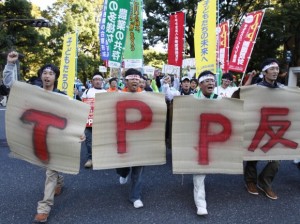Seven Reasons to Fight the TPP
The Trans-Pacific Partnership (TPP) is a massive new trade and investment pact being pushed by the U.S. government at the behest of transnational corporations, threatening the economy, environment and public health both at home and abroad.
The TPP is currently being negotiated behind closed doors by the United States, Australia, Brunei Darussalam, Canada, Chile, Malaysia, Mexico, New Zealand, Peru, Singapore and Vietnam — but it is also specifically intended as a “docking agreement” that other Pacific Rim countries will join over time, with Japan, the Philippines, Thailand, South Korea and others already expressing some interest in doing so. Negotiations are scheduled to conclude in October 2013. International campaigners are fighting hard to prevent the deal from going through.
The TPP is said to contain 29 separate chapters, covering everything from food safety standards to banking regulations.
Here are some of the many reasons activists are fighting the current direction of the TPP:
1. To stop big rollbacks in wages and working conditions. Many corporations are looking for ways to reduce labor costs and undercut worker power — not only in the United States, but in countries like Mexico, China and beyond. The TPP would grant corporations cheaper and more secure access to labor markets in countries such as Vietnam where workers are paid just a fraction of what Chinese sweatshop workers are paid. Whether or not corporations decide to move their production to these lower-paid countries, the threat of moving there (or of being undercut by competitors who have already done so) can be used to suppress employee demands for compensation and other benefits virtually anywhere in the world.
2. To head off attacks on environmental protections. A wide range of transnational corporations, including those in extractive industries, have pushed for investment provisions in the TPP that would enable them to challenge virtually any new law, regulation or even court decision that adversely affects their expectation of profits as an “indirect expropriation” or “regulatory taking” through international tribunals that circumvent domestic judicial systems. Similar provisions under past trade pacts have already been used to weaken portions of the Clean Air Act, Endangered Species Act and Marine Mammal Protection Act in the United States, as well as the environmental and consumer safety protections of developing countries throughout the world. The TPP would vastly expand what is effectively an alternative court for the exclusive use of transnational corporations.
3. To maintain access to affordable medications. The leaked U.S. proposal for an intellectual property chapter within the TPP would have the effect of extending monopoly drug patents for big pharmaceutical companies, making it harder for countries to produce or procure low-cost generic medications for people with HIV, tuberculosis, cancer and other life-threatening diseases. The TPP threatens to increase healthcare costs in developed countries, effectively denying access to life-saving medicines for the poor.
4. To avoid further financial deregulation. Wall Street banks, insurance companies and hedge funds want the financial services provisions of the Trans-Pacific Partnership to handcuff the steps governments can take to protect against “too big to fail,” regulate trade in toxic assets, erect firewalls between different financial service firms and control the flow of short-term capital into and out of national economies.
5. To prevent new caps on food safety protections. The so-called “life sciences” corporations that produce pesticides, food additives and genetically-modified organisms have a history of using trade pacts like the TPP to erect barriers making it harder for countries to adopt and maintain strong food safety regulations based on the precautionary principle. Even consumer right-to-know rules requiring product labeling have been attacked and dismantled.
6. To deter concentration of global food supplies. Big agribusiness middlemen want the TPP to enable them to “buy low” and “sell high” throughout the Pacific Rim, a practice that would help concentrate global food supplies in their hands, undercutting family farmers, forcing new waves of migration away from rural areas and potentially leading to wild fluctuations in food prices for consumers.
7. To protect local development policies. A range of corporations want the TPP’s procurement provisions to prevent governments from instituting public purchasing preferences designed to keep taxpayer funds circulating in and supporting local economies. They also want to prevent government contracts from being used to advance a variety of other environmental, social and human rights goals.
Arthur Stamoulis is executive director of Citizens Trade Campaign citizenstrade.org and a contributor to the CIP Americas Program www.americas.org
For More Information:
* Citizens Trade Campaign citizenstrade.org
Citizens Trade Campaign was the first organization to publish leaked TPP texts and has organized civil society responses to negotiating rounds held in San Diego, Dallas, Chicago and elsewhere.
* Cross-border organizers have proposed an international day of action on the TPP for Saturday, May 11 — just prior to the next negotiating round in Lima, Peru. Details can be found at tppxborder.org




